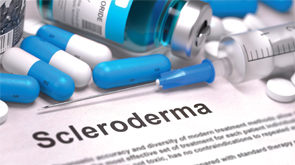
Nine out of 10 scleroderma cases include clinical signs of GI involvement.
Tashatuvango/shutterstock.com
CHICAGO—Nine out of 10 scleroderma cases include clinical signs of gastrointestinal (GI) involvement, with severe involvement associated with high mortality rates, but the pathology of this is not very well understood, a GI expert said at the ACR’s State-of-the-Art Clinical Symposium.
That has left clinicians with a slate of treatments—anti-reflux, antimicrobials and prokinetics—that address only the symptoms, some with more effectiveness than others, and some with more side effects, said John O. Clarke, MD, clinical director of the Johns Hopkins Center for Neurogastroenterology.
In scleroderma, the GI tract is the most commonly involved system, other than the skin, with the esophagus most commonly affected. Typical symptoms in scleroderma patients range widely, including dysphagia, heartburn, regurgitation and nausea, abdominal pain, diarrhea, constipation and incontinence. Other rheumatic diseases can also have varied involvement, but it tends to be less widespread, Dr. Clarke said.
GI involvement is the presenting feature in just 10% of scleroderma cases, but autopsies have found involvement in 94%. Severe involvement has been found in only about 8% of cases, but just 15% of those patients survive more than nine years, and GI involvement is the third-leading cause of mortality in scleroderma.
A four-stage process of GI involvement has been proposed, with an early vascular lesion followed by neural dysfunction, and then smooth muscle atrophy followed by smooth muscle fibrosis. But autopsies have found that smooth muscle atrophy is found more commonly in these patients than fibrosis, refuting the theory.

Dr. Clarke
“This is controversial,” Dr. Clarke said. “The bottom line is that it’s not entirely certain that this four-stage [process] is correct.”
Dysmotility is the main manifestation, with poor propulsion of food through the gut.
“I do think that dysmotility is so frequent in these patients that, if you see someone who comes in with characteristic symptoms, it’s very reasonable to treat them up front,” Dr. Clarke said.
Treatments
The main lifestyle changes for reflux are stopping smoking, avoiding alcohol, elevating the head at least two inches when sleeping and not eating within three hours of sleeping. Avoiding certain foods can have different effects in different people, Dr. Clarke said.
The most effective medical treatment is proton-pump inhibitors, which take longer to start working but are longer acting. Prokinetics that strengthen the lower esophageal sphincter are another option, but only metoclopramide is FDA approved. Other treatments, including the 5HT1-receptor agonist buspirone, are emerging, Dr. Clarke said.


